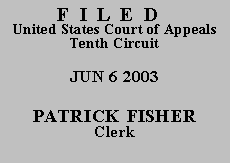

| DARRELL LAWSON,
v.
DANITA G. ENGLEMAN and
STEVE FIORETTI, in their individual
and official capacities |
No. 03-7012
(D.C. No. 02-CV-261-P) |
Lawson first claims that the defendants engaged in malicious prosecution, "which resulted in the bringing of . . . felony charges against [him], without probable cause, with malice, and that as a result [he] was coerced into pleading guilty to charges he was not guilty of and sentenced to imprisonment." (1 R. Doc. 2 at 3-A.) "[W]hen a state prisoner seeks damages in a § 1983 suit, the district court must consider whether a judgment in favor of the plaintiff would necessarily imply the invalidity of his conviction or sentence; if it would, the complaint must be dismissed unless the plaintiff can demonstrate that the conviction or sentence has already been invalidated." Heck v. Humphrey, 512 U.S. 477, 487 (1994).(1) Although Lawson insists that he is not challenging his conviction or sentence, we agree with the district court that Lawson's claim for malicious prosecution is not cognizable under § 1983 because success on his § 1983 cause of action would necessarily imply the invalidity of his conviction, and because Lawson has presented no evidence to suggest that his conviction or sentence has already been invalidated.(2) Id. at 484.
In addition to malicious prosecution, Lawson alleges that the defendants "subjected [him] to an intentional infliction of emotional distress and/or cruel and unusual punishment, in violation of the 8th Amendment to the U.S. Constitution and/or the common law of Oklahoma." (1 R. Doc. 2 at 3-B.) Observing that "[n]o Federal civil action may be brought by a prisoner confined in jail, prison, or other correctional facility, for mental or emotional injury suffered while in custody without a prior showing of physical injury," 42 U.S.C. § 1997e(e), and noting that Lawson has made no such showing, the district court dismissed this claim. We conclude that this claim was properly dismissed. While claims for mental and emotional distress are cognizable under § 1983, under § 1997e(e) "such a suit [by a prisoner] cannot stand unless the plaintiff has suffered a physical injury in addition to mental or emotional harms." Perkins, 165 F.3d at 807. (quotation omitted).(3)
The judgment of the district court is affirmed.(4) The mandate shall issue forthwith.
ENTERED FOR THE COURT
Carlos F. Lucero
Circuit Judge
*. The case is unanimously ordered submitted without oral argument pursuant to Fed. R. App. P. 34(a)(2) and 10th Cir. R. 34.1(G). This order and judgment is not binding precedent, except under the doctrines of law of the case, res judicata, and collateral estoppel. The court generally disfavors the citation of orders and judgments; nevertheless, an order and judgment may be cited under the terms and conditions of 10th Cir. R. 36.3.
1. Lawson notes that while Heck involved a § 1983 suit, he is also seeking relief under § 1985. However, the holding in Heck has been extended to apply to claims brought pursuant to § 1985. See Amaker v. Weiner, 179 F.3d 48, 5152 (2d Cir. 1999) (citing cases); Stephenson v. Reno, 28 F.3d 26, 2627 (5th Cir. 1994) (per curiam).
2. In his reply brief, Lawson argues that Heck applies only to suits seeking monetary damages, and that he is also seeking declaratory and injunctive relief. He does not specify what such declaratory or injunctive relief would entail. This court has noted that Heck should apply "when the concerns underlying Heck exist," which include "those claims that would necessarily imply the invalidity of [the] conviction." Beck v. Muskogee Police Dep't, 195 F.3d 553, 557 (10th Cir. 1999); see also Edwards v. Balisok, 520 U.S. 641, 648 (1997) (applying Heck to claims for declaratory relief). Because of the nature of Lawson's allegations, i.e., false and malicious arrest and imprisonment, his request for declaratory and injunctive relief necessarily implies the invalidity of his conviction or sentence. See Kutzner v. Montgomery County, 303 F.3d 339, 341 (5th Cir. 2002) (quotation omitted) (noting that such claims "must be brought as habeas corpus petitions and not under § 1983"); Heck, 512 U.S. at 48487. Thus, we conclude that Lawson's claims for declaratory and injunctive relief are barred under Heck.
3. Lawson emphasizes on appeal that in addition to his § 1983 claim, he also made a state-law tort claim for intentional infliction of emotional distress. As we have concluded, however, Lawson simply has no cause of action under § 1983. When a plaintiff's federal claims are dismissed before trial, the state claims should also be dismissed as well. United Mine Workers of Am. v. Gibbs, 383 U.S. 715, 726 (1966).
4. Because a certificate of appealability is not necessary for a prisoner civil rights appeal, we do not consider Lawson's motion for a certificate of appealability.